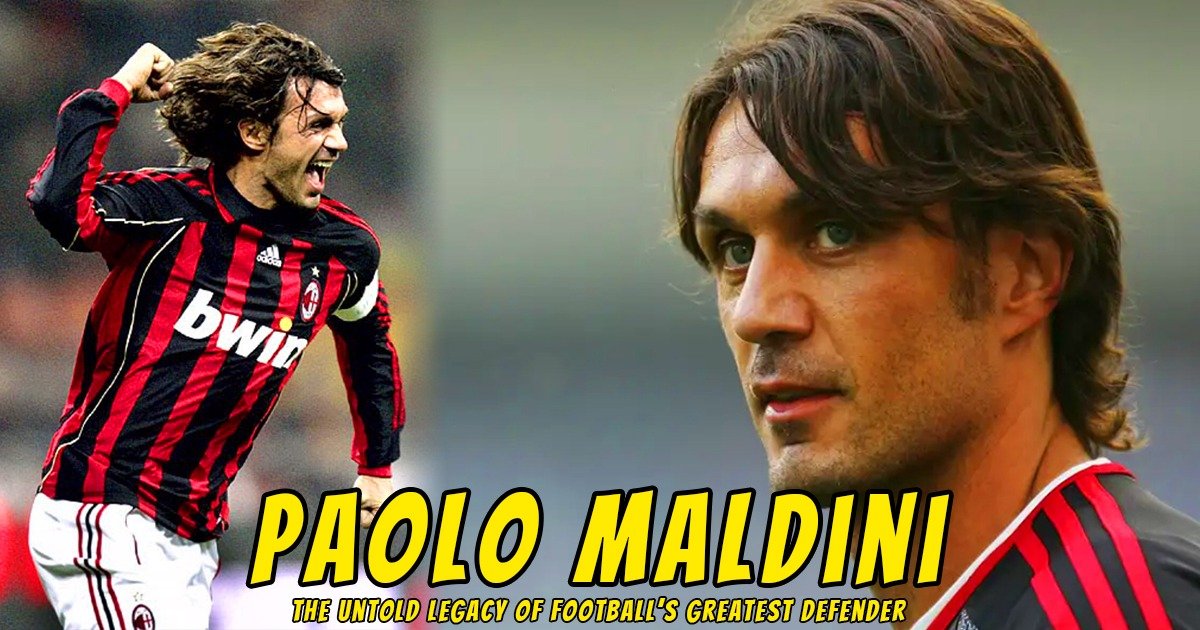Paolo Maldini is a name synonymous with football excellence and enduring legacy. Over a career spanning more than two decades, Maldini became one of the most revered figures in the sport, celebrated for his extraordinary defensive skills, leadership, and unwavering commitment. This blog post delves into the remarkable journey of Paolo Maldini, from his early beginnings to his post-retirement influence, highlighting his achievements, statistics, and lasting impact on football.
Early Life and Career Beginnings
Born on June 26, 1968, in Milan, Italy, Paolo Maldini grew up in a footballing family. His father, Cesare Maldini, was a prominent footballer and coach, which significantly influenced Paolo’s career. Starting his youth career with AC Milan’s youth academy, Maldini’s talent quickly became apparent. He made his professional debut for AC Milan in January 1985, at just 16 years old, marking the beginning of an illustrious career.
Rise to Stardom with AC Milan
Paolo Maldini’s rise to stardom was closely tied to his long tenure at AC Milan. He spent his entire professional career with the club, a rare feat in modern football. Maldini’s versatility was a key factor in his success; he could play as a left-back, center-back, or even a left wing-back, showcasing his adaptability and defensive prowess.
Career Highlights and Achievements
Paolo Maldini’s career is decorated with numerous accolades and achievements. One of the most notable aspects of his career is his longevity and consistency. He retired at the age of 41, marking the end of an era for both AC Milan and football in general. His retirement came in 2009, concluding a career that spanned 25 years at the top level.
Did Paolo Maldini Win a World Cup?
Despite his incredible success at the club level, Paolo Maldini never won a FIFA World Cup. He represented Italy in four World Cups (1990, 1994, 1998, and 2002), with his best finish being a runner-up in 1994 when Italy lost to Brazil in the final. Despite this, his impact on the game and his domestic success overshadowed this gap in his trophy cabinet.
How Many UCLs Did Maldini Win?
In terms of European success, Paolo Maldini was incredibly successful. He won the UEFA Champions League (UCL) five times during his career, in 1989, 1990, 1994, 2003, and 2007. His performances in these tournaments, particularly in the 2003 and 2007 finals, were instrumental in securing these titles for AC Milan.
Statistical Overview
Paolo Maldini’s statistics are a testament to his remarkable career. Over his 25 years with AC Milan, he made 1,078 appearances in all competitions, a figure that includes 647 Serie A matches. Maldini scored 40 goals for the club, showcasing that even as a defender, he had a knack for making crucial contributions. His defensive statistics are equally impressive, including a record number of clean sheets and a reputation for exceptional man-marking and tactical intelligence.
Influence and Legacy in Football
Paolo Maldini’s influence on football extends beyond his playing days. Known for his exceptional defensive skills, Maldini’s leadership and professionalism set a standard for aspiring footballers. His ability to read the game, combined with his physical attributes, made him one of the best defenders of his generation. Maldini’s legacy is also evident in his role as a mentor and his involvement in football management after his playing career.
Memorable Matches and Moments
Paolo Maldini’s career was filled with memorable matches and moments. One notable instance was the 2005 UEFA Champions League final, often referred to as “The Miracle of Istanbul.” Despite AC Milan’s dramatic loss to Liverpool in that match, Maldini’s performance throughout the tournament was exceptional. Another significant moment was the 2007 Champions League final, where Maldini led AC Milan to victory over Liverpool, avenging their previous defeat and securing his fifth European Cup.
Did Maldini Play Against Messi?
Yes, Paolo Maldini did face Lionel Messi during his career. One of the notable encounters was in the 2004-2005 UEFA Champions League season, when AC Milan played against Barcelona in the group stages. Messi, then a young and emerging talent, faced Maldini, who was at the height of his defensive prowess. These encounters highlighted the contrast between the experienced defender and the budding star, adding to the rich tapestry of Maldini’s career.
Paolo Maldini’s Awards and Honors
Throughout his career, Paolo Maldini received numerous awards and honors, reflecting his contributions to the sport. He was named Serie A Defender of the Year multiple times and was included in the UEFA Team of the Year on several occasions. Maldini also received the prestigious Ballon d’Or nomination, further cementing his status as one of football’s greats.
Post-Retirement and Continued Influence
After retiring from professional football, Paolo Maldini continued to influence the sport in various capacities. He took on roles in football administration and management, contributing his expertise to the development of the game. Maldini’s involvement with AC Milan as a director and his role in football punditry have allowed him to share his insights and continue shaping the sport.
Charitable Work and Personal Endeavors
Beyond his football career, Paolo Maldini has been involved in various charitable and personal endeavors. His commitment to giving back to the community is a testament to his character. Maldini has been involved in numerous philanthropic activities, including supporting children’s hospitals and educational initiatives.
In addition to his charitable work, Maldini has expressed a strong interest in environmental causes. He has been vocal about the need for sustainability and has participated in campaigns aimed at promoting environmental awareness. His involvement in these causes reflects his dedication to making a positive impact both on and off the pitch.
Maldini’s personal life, including his family and interests outside of football, also paints a picture of a well-rounded individual. His commitment to his family and his involvement in various hobbies and interests showcase a life that extends beyond his football achievements.
Tactical Evolution and Versatility
One of Paolo Maldini’s most remarkable attributes was his ability to adapt and evolve tactically throughout his career. Starting as a left-back, Maldini’s early years were characterized by his exceptional one-on-one defending and ability to support the attack. As he progressed in his career, his role evolved significantly.
In the mid-1990s, Maldini began to play more frequently as a center-back, a transition that showcased his versatility. This shift was not just a change in position but an evolution in his playing style. His understanding of the game allowed him to excel in a more central role, where he became known for his ability to read the game, intercept passes, and organize the defense. His leadership on the field was instrumental in guiding the defense and communicating with his teammates.
Maldini’s adaptability was also evident in his role during different tactical systems employed by AC Milan. Whether playing in a traditional back four or in a three-man defense, he seamlessly adjusted his style to suit the team’s needs. This tactical flexibility not only prolonged his career but also highlighted his footballing intelligence and understanding of various defensive roles.
Mentorship and Influence on Young Players
Paolo Maldini’s impact extended beyond his on-field performances; he was also a significant mentor to younger players. His professionalism and work ethic served as a model for aspiring footballers. Throughout his career, many young players looked up to him, both within AC Milan and across the footballing world.
Maldini’s role as a mentor became even more pronounced after his retirement. In his capacity as a director at AC Milan, he played a crucial role in nurturing young talents. His insights and experience were invaluable to the club’s youth academy, where he helped develop the next generation of footballers. Maldini’s approach to mentoring involved not just tactical guidance but also instilling the values of discipline, commitment, and respect for the game.
His influence on players like Alessandro Nesta, who was his defensive partner for many years, and younger talents like Theo Hernández, who looked up to him for advice and inspiration, underscores the lasting impact Maldini had on players of all ages.
Legacy and Recognition
Paolo Maldini’s legacy is celebrated not just through his trophies and statistics but also through the recognition and admiration he received from peers, critics, and fans alike. His contributions to football have been acknowledged through various honors and accolades.
In 2009, the year of his retirement, Maldini was awarded the prestigious FIFA World Cup Golden Ball, recognizing his lifetime achievements in football. Additionally, he was inducted into the Italian Football Hall of Fame and the UEFA Hall of Fame, cementing his status as one of the greatest defenders in the history of the sport.
Maldini’s legacy is also reflected in the admiration he commands from fellow players and football legends. Many have praised his skill, professionalism, and dedication, highlighting his role as a role model for future generations. His name remains synonymous with excellence, and his influence continues to be felt in the footballing world.
Conclusion
Paolo Maldini’s career is a remarkable story of dedication, skill, and legacy. From his early beginnings in Milan to his legendary status with AC Milan, Maldini’s impact on football is undeniable. His achievements, including five UEFA Champions League titles, his defensive prowess, and his role in shaping the sport, make him a timeless icon. Paolo Maldini’s story is not just about his footballing skills but also about his contribution to the game and his enduring influence on future generations.

Evelyn White is an experienced content writer with a background in lifestyle, trends, and practical advice. With several years of writing across digital platforms, she specializes in making everyday topics accessible, informative, and engaging. Her goal is to deliver trustworthy, reader-focused content that’s both useful and easy to understand.
